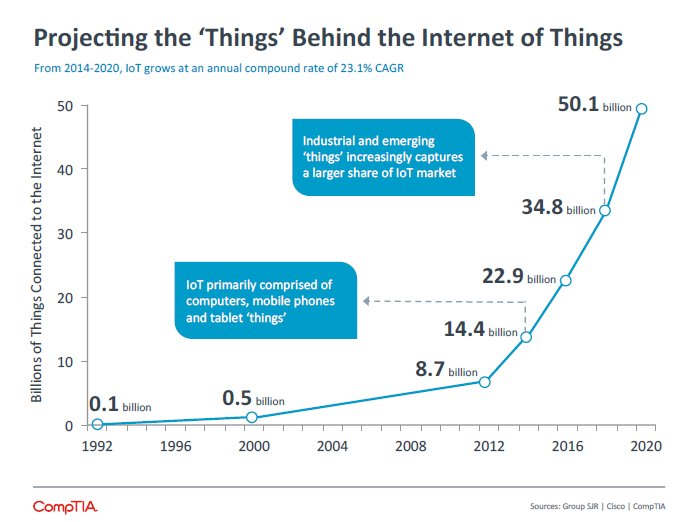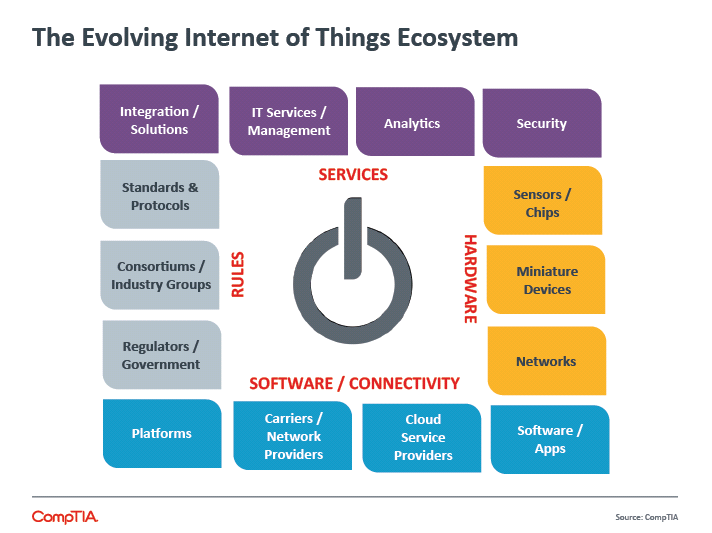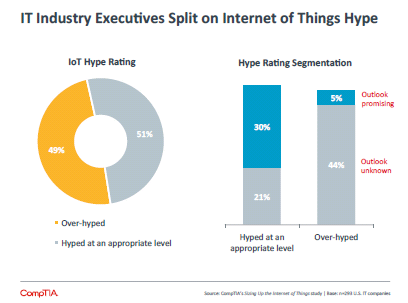
Could the Internet of Things Be Overhyped?
The Internet of Things is expanding—it's expected to jump from half a billion "things" in 2000 to an estimated 50 billion by 2020—but does that expansion match up with general interest? A CompTIA report sizes things up.
Connected devices are moving way beyond smartphones.
Innovators in the Internet of Things (IoT) are hooking up all sorts of things to the internet—everything from the lights and thermostats in homes to public transportation.
But there’s a problem: The hype may be outpacing the actual need. Is the buzz out of whack? The trade group CompTIA examined that question by checking the pulse of executives at 293 U.S. information technology companies in its report, “Sizing Up the Internet of Things,” released last month.
Sizing Up the Field

The IoT concept aims to “enhance the utility of devices, objects, structures, and even people through connectivity, network effects, and intelligent functionality,” CompTIA says. Thus far, progress has been fast-moving. The trade association estimates there were 14.4 billion connected devices this year—mostly computers, smartphones, and tablets—a number expected to jump to 22.9 billion “things” within two years as industrial products begin to connect.
The rising number of connected devices naturally leads to rising economic value. IDC predicts the industry, valued at $1.9 trillion worldwide in 2013, will surge in value to $7.1 trillion by 2020, according to the report. General Electric has an even bolder prediction, forecasting that the industry will add $10 trillion to $15 trillion in global gross domestic product over the next 20 years.
A Constant Cycle

But getting to that point won’t be easy. CompTIA notes a number of factors that could slow down the technology’s progress, including “inevitable standards battles, security breaches, privacy concerns, monetization challenges, and other unintended consequences.” Already, multiple groups are seeking standards for the industry.
Connected devices have different needs from laptops and smartphones, and that means there’s a constant need for development of new hardware and software. While there are already established players—among them mobile manufacturers like Microsoft, Apple, and Google—”different vendors are also seeking to expand their operating systems into those areas,” CompTIA says. In other words, the field is far from settled.
What Execs Think

So what do IT executives think about the Internet of Things? They are about evenly split. According to the study, 51 percent of IT executives say the hype is justified, and 49 percent disagree. (While far from a clear-cut result, it nonetheless beats a recent consumer study, which found that 87 percent of respondents didn’t even know what the term “Internet of Things” means.)
CompTIA found that many IT execs who say the connected devices space is overhyped believe the outlook is “uncertain.” That view was particularly common among smaller firms, “which may be a function of risk aversion or possibly a ‘here and now’ mindset, whereby emerging opportunities are not yet a focus,” CompTIA says.
So what’s your take? Is the connected devices sector worth the attention it’s getting? Offer your thoughts in the comments.
(iStock/Thinkstock)






Comments